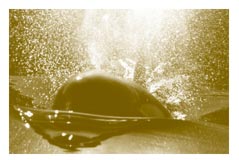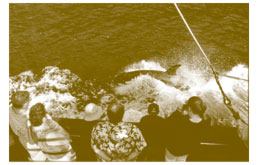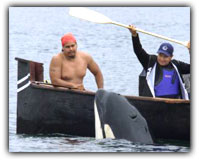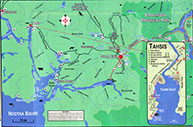Luna(L98) – Nootka Sound’s Friendly Orca
A true tale of a legendary whale
Article by Suzanne and Mike Chisholm
In July, 2001, a stranger came to Nootka Sound and changed many lives. When he died on March 10, 2006, he left many broken hearts. He was a lone killer whale, an orca. He was just a child, in orca terms when he arrived in Nootka Sound. But in the years to follow he would become a legend.
 The little orca had many names. He was called L-98 by scientists, Luna by a naming competition, and Tsu’xiit by the Mowachaht/Muchalaht First Nation of Nootka Sound. For simplicity, we’ll call him Luna here.
The little orca had many names. He was called L-98 by scientists, Luna by a naming competition, and Tsu’xiit by the Mowachaht/Muchalaht First Nation of Nootka Sound. For simplicity, we’ll call him Luna here.
Luna was born on September 19, 1999, into a group of whales called L-pod, one of three pods in the Southern Resident group of killer whales. The Southern Residents spend summers near Victoria. They are considered endangered by the governments of both Canada and the United States. There are about 90 Southern Resident orcas, all of whom are individually identified and named. Southern Resident whales, like their Northern Resident cousins who spend summers near the northeast end of Vancouver Island, eat only fish. Other orcas, known as transients because they visit unpredictably, eat warm-blooded animals like seals.
In 2001, when Luna was less than two years old, he was separated from his family and turned up alone in Nootka Sound. One of the first ships he learned to play with was the MV Uchuck III, which cannot travel faster than he could swim. He learned to play in the bow waves or the wake of the Uchuck III very early in his visit to Nootka Sound and seemed to develop a lasting affection for the big old ship.
Nobody knows exactly how or why Luna came to Nootka Sound. It is extremely rare for killer whales to go solo. They are highly social animals, and whales from Luna’s group spend their entire lives together. When Luna was first identified in Nootka Sound in 2001, many scientists were skeptical that he would survive. Would he get enough food?
But survive he did. He was never fed by humans, and managed to feed himself enough. Scientists think he ate a lot of pilchards that first year. Pilchards are not a normal prey fish for orcas, but he must have learned fast how to adapt.
When Luna was first seen, he was estimated to be about 12 feet long. By March 2006 Luna was estimated at about 18 feet long. A full-grown male orca averages 27 feet long and weighs 9,000 pounds.
Southern Resident orcas are among the most social mammals in the world. In the absence of other orcas from his own family group, Luna made a kind of rough-and-ready pod out of boats and people. From his early days in Nootka Sound, he played with boats. He liked to rub up against the hulls of boats, he swam alongside the “boom boats” in the booming grounds, he pushed rudders, and he loved to play with water gushing from a hose. He also seemed to like to make eye contact with people, and it was likely, based on scientific observation of orcas in captivity and of some of his own behaviours, that he recognized individuals.
Many people in Nootka Sound developed a deep affection for Luna. Some scientists believe that it is possible that he survived partly because in his early days in Nootka Sound he had a significant amount of social contact with people. But the other side of this coin is that Luna’s habituation to humans may have diminished his chances of returning to his pod. Most scientists agree that the longer Luna was separated from his pod, the less likely he would have been to successfully reunite.
Therefore, the government decided to prevent people from interacting with Luna. Federal law prohibits the disturbance of a marine mammal. The Department of Fishe ries and Oceans, which manages orcas, decided in 2002 that playing with Luna constituted disturbance, and charged and convicted people who were caught petting Luna. The maximum fine for such a crime is $100,000. Eventually, fewer people intentionally sought to play with Luna, but he still got a great deal of interaction anyway. How? By pursuing boats that were not fast enough to outrun him.
ries and Oceans, which manages orcas, decided in 2002 that playing with Luna constituted disturbance, and charged and convicted people who were caught petting Luna. The maximum fine for such a crime is $100,000. Eventually, fewer people intentionally sought to play with Luna, but he still got a great deal of interaction anyway. How? By pursuing boats that were not fast enough to outrun him.
The MV Uchuck III is one of these. But many smaller boats, like tugs, barges, and boom boats, were also too slow to run away from him, so he spent much of his time playing with them. He also tried to play with sailboats or with fishing boats when they were trolling.
This caused some problems. Luna was not like a garbage bear or a cougar that might wander into a human community, because he never showed any inclination to react with violence toward human beings. He just seemed to want to play. But he was large and powerful, and occasionally caused damage to boats by pushing them around.
Luna also became an important part of life on Nootka Sound for the Mowachaht/ Muchalaht First Nation, which is a member of the Nuu-chah-nulth group of aboriginals. The orca species as a whole is highly revered by many First Nations cultures, but in addition to that, Luna showed up in Nootka Sound at a very important moment, shortly after the passing of Chief Ambrose Maquinna. Friends of Ambrose report that before he died, he said that he would like to come back as kakawin, which is the Nuu-chah-nulth word for orca. Many members of the Mowachaht/Muchalaht believe that Luna, whom they call Tsu’xiit, embodies the spirit of their late chief. The Mowachaht/ Muchalaht have deep respect for all orcas, and for this one in particular.
In 2004, the Canadian government attempted to capture Luna to move him back to his pod near Victoria to attempt a reunion. When the government boats tried to lure Luna into a pen to prepare him for a long truck ride south, members of the Mowachaht/ Muchalaht First Nation went out in their canoes, singing and paddling. Luna followed the canoes. After a nine-day period that the press described as a “Tug-of-whale,” the Department of Fisheries and Oceans called off the relocation.
During the summers of 2004 and 2005, the Mowachaht/Muchalaht First Nation conducted stewardship programs to try to keep Luna and the public safe. In March, 2006, the Department of Fisheries and Oceans was making plans to discuss a summer stewardship program for Luna with the Mowachaht Muchalaht First Nation and a group of scientists had submitted an application to study Luna.
Unfortunately on th e morning of March 10, 2006, Luna was accidentally killed by the propeller of a large tugboat from Vancouver. He died in the waters off Concepcion Point, Bligh Island, in a part of Nootka Sound he seemed to love. His death was reported around the world. Many questions remain. Why did Luna come here? Why didn’t he swim away and find other whales? Would a reunion with his family have been successful? Could something more have been done to keep him and the public safer right here in Nootka Sound?
e morning of March 10, 2006, Luna was accidentally killed by the propeller of a large tugboat from Vancouver. He died in the waters off Concepcion Point, Bligh Island, in a part of Nootka Sound he seemed to love. His death was reported around the world. Many questions remain. Why did Luna come here? Why didn’t he swim away and find other whales? Would a reunion with his family have been successful? Could something more have been done to keep him and the public safer right here in Nootka Sound?
Most of these questions can never be answered. What we do know is that Luna was very unusual. He was, however, not unique. A few dolphins or beluga whales have recently been socializing with human beings in different parts of the world, including on Canada’s East Coast. Scientists have coined a new term for these animals: “Solitary sociables.” Researchers think the appearance of these lone animals may have something to do with changing ocean currents, pollution, or simply natural accident.
Luna’s sojourn in Nootka Sound was a great gift from the wild to the people here and to the many visitors who came to see him. Those who were privileged to meet Luna learned to respect his curiosity, his enthusiasm, his exuberance at play, and what appeared to be his very consistent affection for people.
Luna will never be forgotten.


I am from Sweden and visiting Vancouver Island right now. When I put on the tv tonight I saw the film of Luna, couldn’t stop watching, so interesting and touching!!
Hi Marlene, welcome to our beautiful province! Hope you see and do everything you want to. Luna was a very special animal and loved very deeply here in Nootka Sound and across the world as witnessed by the outpouring of condolences after his death. He touched many lives with his presence and will be missed very much.
Sounds like Luna was a very special whale. Showed lots of compassion for humans.
Why can’t humans show the same compassion for all wildlife. This was the most beautiful story I have heard in a long time. Although it ended on a sad note it was a memorable story I will never forget. So glad he got the interaction with humans that he missed out on with his own family. Everyone deserves to be loved whether it be mammal or humans. I am sure Luna will go down as a legend in the harbour where he lived. Luna did not know you but y ou will be missed by every one who came in contact with you.
Pat R.
Ontario
Yes he was something special that’s for sure. Personally, I got to see him up close and I can tell you I saw intelligence and emotion in his eyes that rivals the human animal for sure. I’ll never forget him as I learned so much from just watching him.
Hello,
I watched the documentary on Luna‘s life earlier today; it was screened to celebrate Earth Day and National Canadian Film Day. Extraordinary story of an incredibly endearing and intelligent baby orca You are truly blessed you got to see him up close!
There was a discussion after the screening, and Michael Parfit mentioned that there are not a lot of people in Nootka Sound in the winter. Was wondering if Luna used to still be around in the winter in that case, or would he return every spring? Wonder how he managed without much socialization in the winter.
Also, were there any sightings of any of the other L-pod members in Nootka Sound, either while Luna was around or after he passed away?
I look forward to visiting Luna’s home some day! ☺️
Thank you in advance,
Uttara
Hi Uttara, thanks for your comments.
Yes Luna was an amazing animal. We saw so much emotion and intellect in his eyes. It was a special treat to have him adopt us and love us the way he did. Memories that will last a lifetime.
As for the winter months, he was still around due to the fact that there was an abundance of salmon to feed on during the winter months in Nootka Sound.
The locals regularly ventured out into the sound to fish or visit their float cabins so he still had some interaction with us.
The local First Nations were monitoring him on a regular basis and Luna became best friends with them and got a lot of attention from that friendship also.
His family never ventured into the inlet for some reason but were spotted offshore a couple of times and an effort to persuade Luna to join them failed. They are still seen to this day travelling up the coast but as far as I know haven’t been seen inside the inlets.
We all miss him terribly and are thankful we were blessed with his presence. The lessons we learned from his visit about orcas and how very smart and social they actually are will hopefully help us all to protect them and let them live their lives as they wish.
GR Chamber, thank you for your response and taking the time to answer all my questions. I appreciate it!
I had always read/heard that orcas were highly social creatures but had no idea until I watched the film on Luna that their need for social interaction surpassed even that of us humans; was amazed to learn that they would even sacrifice food for it! Luna’s visit definitely taught us a lot about their complex behaviours and personality traits.
Also watched the documentary on Springer, the other Resident baby orca who was also found separated from her family around the same time as Luna. It is sad that Luna’s story did not have a happy ending like Springer’s — but given that Springer’s reunion with her pod set a precedent, marine authorities will hopefully be more open to taking chances next time a lost baby orca shows up — knowing that a reunion after separation is entirely possible.
My brother Ron Botel, with his fishing boat the Natalya was hired by the government to catch food for Luna while they tried to save/relocate him.
Hi Sandra, thanks for the comment. I remember that time well.